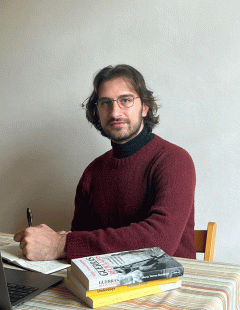Samuel Ritholtz
Department Lecturer in International Relations, Department of Politics and International Relations, University of Oxford.
What were you doing before you came to ODID?
I'm from New York in the USA. Prior to studying at ODID, I worked at a small human rights law firm in Washington DC that advocated for political prisoners globally. I have also worked as a volunteer policy advisor on US presidential and congressional campaigns and in the Executive Office of the Secretary General of the United Nations.

‘Not only did I learn the research skills necessary to be an academic, but I also received important training in ethics that have made me a more considerate and ethical researcher’.
‘Not only did I learn the research skills necessary to be an academic, but I also received important training in ethics that have made me a more considerate and ethical researcher’.
Please tell us about your career since leaving ODID
Upon completing my DPhil, I received a Max Weber Postdoctoral Fellowship at the European University Institute in Florence, Italy. Upon completing my postdoc, I've been lucky to return to Oxford as a lecturer in the Department of Politics and International Relations.
And your current job?
I'm an academic! I research and teach on topics related to LGBT experiences of conflict, crisis, and displacement
Why did you choose ODID and your course?
I chose to study at ODID because of its Refugee Studies Centre, which has leading scholars and practitioners working on topics related to displacements. After a year on the MSc in Refugee and Forced Migration Studies, I decided to stay at the department to pursue doctoral work.
How has your education at Oxford benefitted you in your career?
My education at ODID made me the researcher that I am today. At ODID, not only did I learn the research skills necessary to be an academic, but I also received important training in ethics that have made me a more considerate and ethical researcher.
What did you particularly value about ODID?
I valued ODID's focus on the real-world impact of our research, the encouragement from the department to engage in fieldwork, and the close-knit nature of the DPhil and broader research community. It's a very unique and special place!
What other activities were you involved with at Oxford?
At Oxford, I was involved with the activities organized by the Rotary Scholarship and the LGBTQ+ Society.
What advice would you give to current students?
Make connections beyond your specific graduate program! ODID is such a special community that I encourage you to get to know your peers in the other graduate programs of the department. You never know where in the world you may encounter them again!
